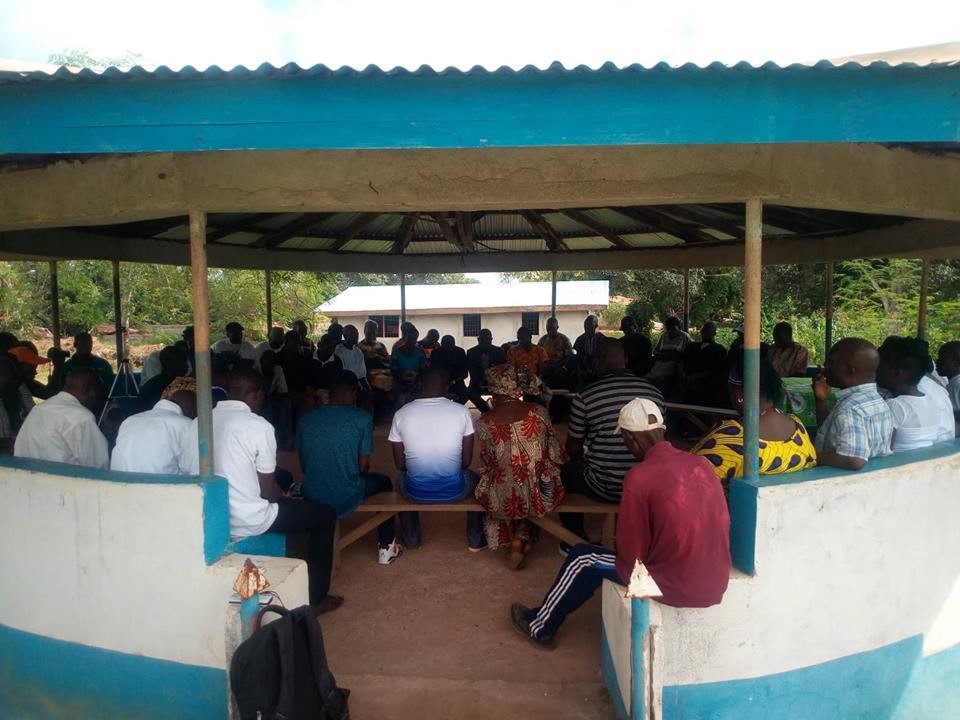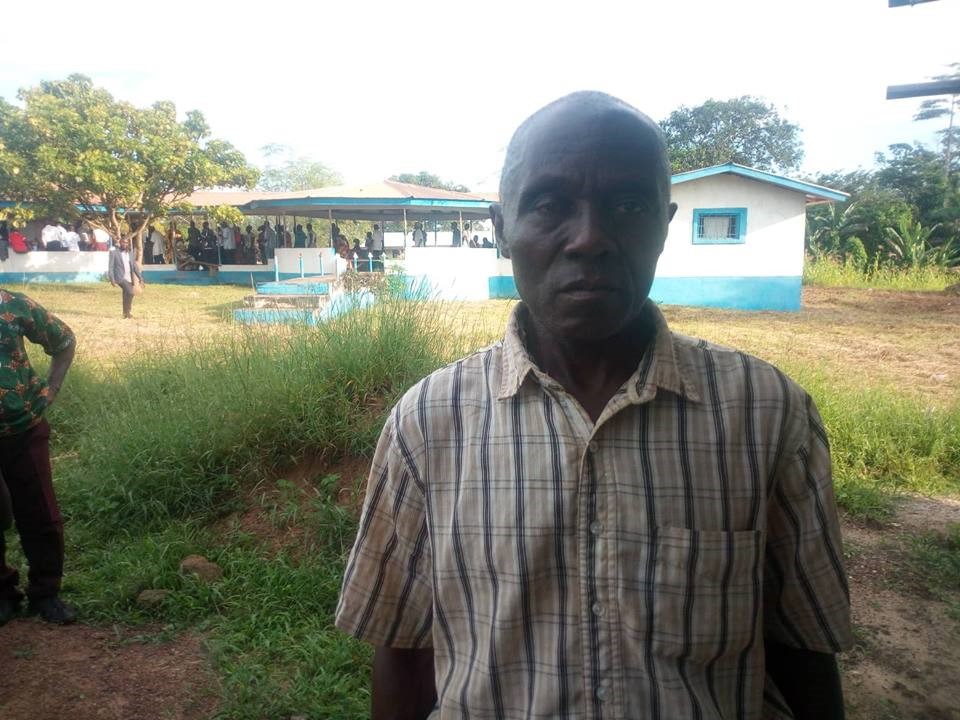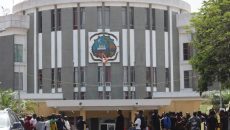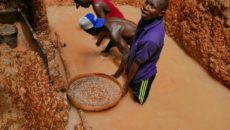SAMAY, Bong – As calls for the establishment of war and economic crimes court in Liberia intensify, victims and survivors of the infamous Samay Massacre have joined, demanding the prosecution of those who carried out the massacre here in 1994 that killed 28 people and destroyed 22 houses.
The massacre occurred on October 27 that year. Survivors said the attackers were fighters of Delta Force, a faction of the National Patriotic Front of Liberia of the jailed former president, Charles Taylor.
Every year on the anniversary, relatives of those killed, the survivors, and town residents gather at a mass grave containing the remains of the dead. At this year’s event, attendees said the horrible event is still seared into their memories even 24 years on.
At a monument marking the grave site, initiated by citizens and later improved through a grant from the Open Society Initiative for West Africa, people became teary as they listened to a historical reflection of the massacre. The monument is a giant-sized cross-shaped concrete structure bearing the names of all those killed from the town during the civil war.

A partial view of the structure bearing the names of those killed during the massacre. Photo: Moses Bailey.
Jerry Cooper, a resident of Samay, said the NPFL soldiers had launched a campaign to reclaim Gbarnga from George Boley’s Liberian Peace Council, when they committed the massacre, accusing the residents of harboring the LPC soldiers.
The LPC soldiers reportedly used the Kokoyah Road, a route that passes through Samay, to attack Gbarnga and later they used the same path to retreat to Grand Bassa after NPFL forces overpowered them in Gbarnga.
“Samay became victim to that effort on the night of October 27, 1994, at about 3:00 to 4:00 a.m.,†Cooper told the gathering.
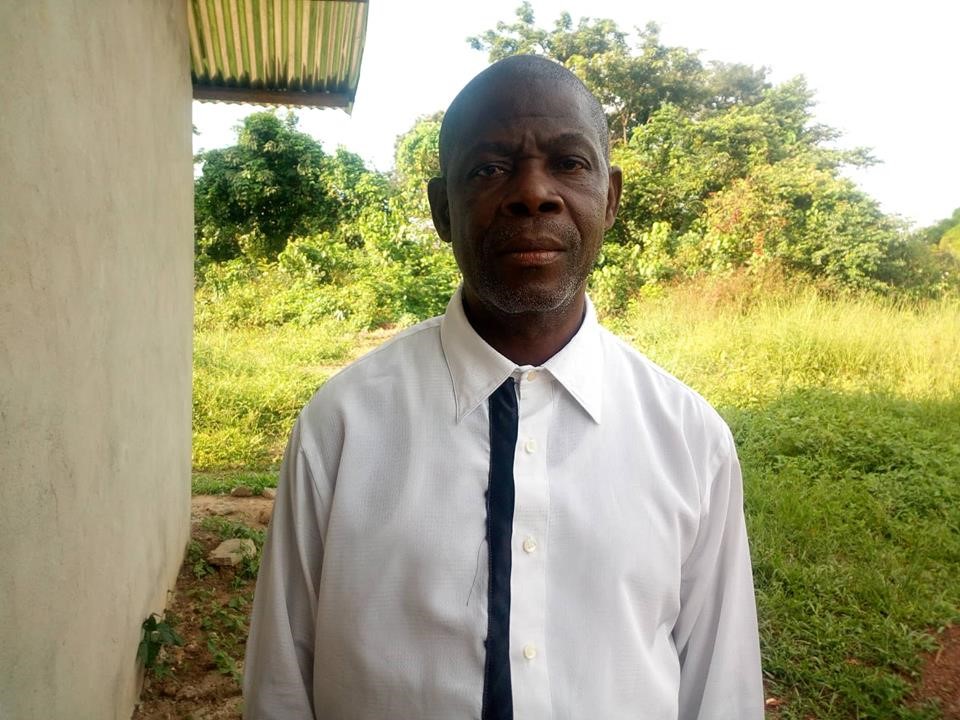
Jerry Cooper of Samay provided a historical account of the massacre during the memorial. Photo: Moses Bailey.
“The NPFL soldiers attacked the town in the night, shooting indiscriminately and setting 22 houses on fire and killing 28 persons in cold blood in this place. It was terrible,†he said.
By the end of the civil wars in 2003, Samay had lost a total of 41 citizens at separate venues and under different circumstances, according to Cooper, those included Bendu Siakor, J. Kpai Siakor, Gertrude Yarkpawolo, Borbor Flomo, Joseph Tamba Tokpa, and Tamay Maai Linga, a well-known traditional midwife.
The Kokoyah Road links Bong, Nimba, and Grand Bassa.
The Truth and Reconciliation Commission, in its final report, lists NPFL and LPC under the “Significant Violator Group†responsible for committing ‘egregious’ domestic crimes, ‘gross’ violations of human rights, and ‘serious’ humanitarian law violations, including economic crime in Liberia between January 1979 and October 14, 2003.
Fatu Tokpah, one of the survivors of the massacre, witnessed her husband (Joseph Tokpah) being killed, a memory that is still fresh with her today. She could not hold back her tears as she shared her experience during the memorial.
“We were sitting together, and the soldiers took my husband and just shot him. I was off completely,†she said through an interpreter translating her native Kpelle language.
In addition to the indelible psychological scar, Tokpah was left with the financial burden of raising the couple’s nine children alone.
Tokpah’s husband was not the only member of her family killed during the war. Earlier, she had lost her sister, father and a brother at different places during the war.
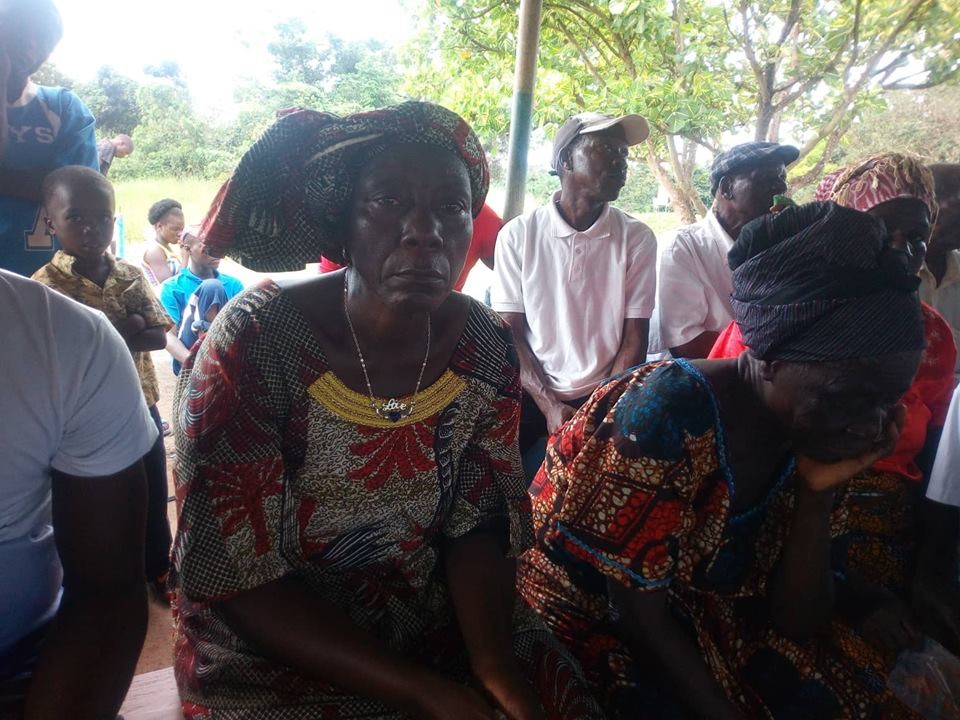
Fatu Tokpah, a survivor of the Samay Massacre, lost her husband and three of her family members to the wars. Photo: Moses Bailey.
Sarah Getala, another survivor of the massacre, carries the scar from a wound she sustained during the massacre. She said the wound was inflicted by a soldier she identified only by the name Abraham. Abraham had demanded that she put down her two-year-old son, whom she was carrying in her arms, before killing her.
“He came and said, ‘Move from the group because you dead body now.’ I told him if you want to kill me, kill the two children plus me because I don’t have anyone to mind these children,†Getala recounted.
Getala said upon her refusal to put down her son, Abraham stabbed her in the chest with a cutlass, inflicting a deep wound. She said the soldiers had earlier killed two other male residents of the community in their presence. Getala identified one of the soldiers who killed a man in her presence as Joseph Tamba. Even though Tamba’s current whereabouts is unknown, Getala remembers him very well.
Like Cooper, Getala also remembers that the head of the fighters who carried out the massacre was known as Devil. Cooper said he saw Devil a few years ago in Margibi while in route to Monrovia.
Getala said she narrowly survived the scene when a man known as JY, one of the soldiers, identified her and immediately asked her to leave the scene. She said she had known JY far before the war.
Since that day, Getala said she has wanted to see justice be done. She supports the establishment of a court that would ensure that the perpetrators face justice and says she would be willing to identify and testify against the perpetrators in a court.
“If they call me to the court, the person that put the mark on me, I know him good, and I know his name. I will go and show him,†Getala said.
Tokpah, too, also shares Getala’s view: “Let the court come, I will go and explain whatever happened here,†she said in an interview through her interpreter.
Ojuku Farr, a resident of a nearby community known as Moses Kwenah Village, lost his father and uncle, Moses Kwenah and John Kwenah, during the massacre. He said the two, along with other family members, were fleeing the massacre when they were killed.
“I am one of those, along with my family, supporting the idea of bringing justice. If those people don’t face trial, another person will pick up the same idea and bring war,†Farr said.
Amid the growing local and international calls for the establishment of a court to persecute war crimes perpetrators, President George M. Weah and his government have remained quiet, even though Weah had called for a court back in 2004.
Among the TRC’s recommendation was “a criminal court with the competence and jurisdiction to adjudicate criminal responsibility for individuals, armed groups and other entities that the TRC determines were responsible for egregious domestic crimes, gross violations of human rights and serious humanitarian law violations.â€
“Such institution shall be specifically endowed with the authority and jurisdiction to adjudicate domestic, IHRL [international human rights law] and IHL [international humanitarian law] violations,†the report said.
Weah’s predecessor, Ellen Johnson Sirleaf, refused to implement this recommendation of the TRC, claiming it would destabilize the country. Opponents claimed her refusal came because Sirleaf herself, was named as one of those who should be barred from public office for 30 years as a result of her wartime activity.
In Samay, people here said they believe the time has come for justice. And that only justice will truly honor the loved ones they honor here each year. They are hoping there will be some movement on the court before they gather again for the same solemn commemoration next year.
This story was produced by The Bush Chicken in collaboration with the New Narratives as part of the West Africa Justice Project.
Featured photo by Moses Bailey
